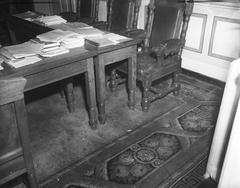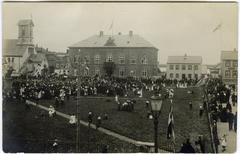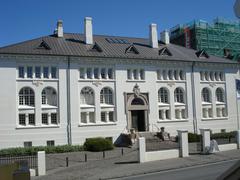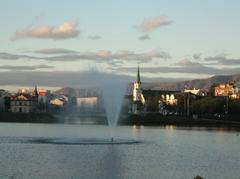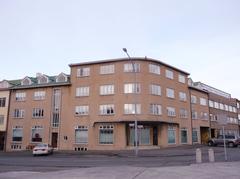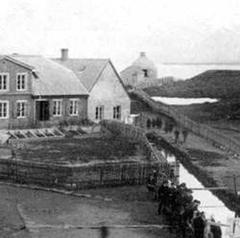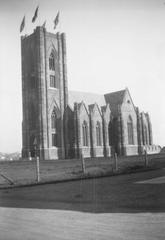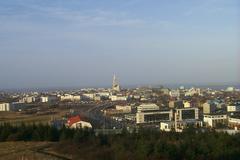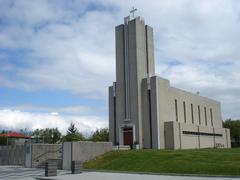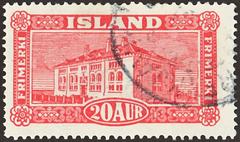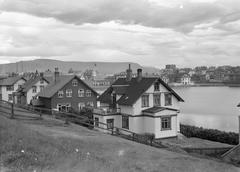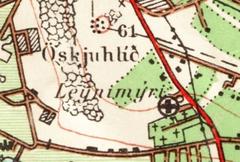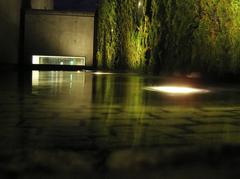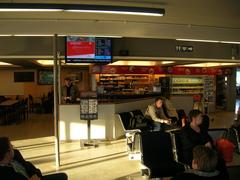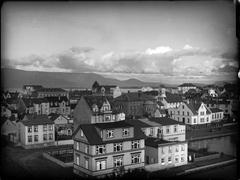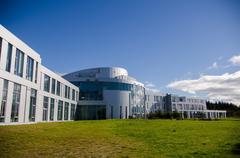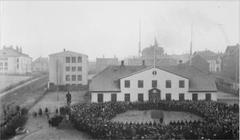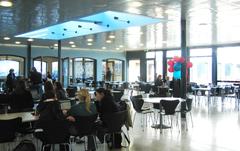Hlemmur Reykjavik Iceland: Visiting Hours, Tickets, and Comprehensive Travel Guide
Date: 04/07/2025
Introduction: Hlemmur’s History and Cultural Significance
Nestled at the eastern end of Laugavegur, Reykjavík’s main shopping street, Hlemmur stands as a vibrant symbol of the city’s dynamic evolution. Originally established in 1978 as Reykjavík’s primary bus terminal—designed by Gunnar Hanson—Hlemmur shaped the city’s transportation and urban life for decades. Its transformation into Hlemmur Mathöll, Reykjavík’s first food hall, in 2017 marked a new chapter, reflecting the city’s commitment to sustainable urban renewal and adaptive reuse of historic structures. Today, Hlemmur seamlessly blends heritage and innovation, serving as a central hub for mobility, community, and culinary discovery.
Visitors can experience both the site’s historical legacy and its contemporary energy. Hlemmur Mathöll offers a diverse culinary scene in a welcoming environment, while the location remains a gateway to iconic Reykjavík landmarks such as Hallgrímskirkja Church, Harpa Concert Hall, and Laugavegur itself. Whether you’re a food lover, history enthusiast, or explorer, this guide provides all the essential details—from visiting hours and accessibility to nearby attractions and travel advice. For up-to-date information, consult resources like the Hlemmur Mathöll website, Reykjavík’s municipal site, and the SPARCS Project Report.
Table of Contents
- Introduction & History
- Origins and Early Development
- Construction of the Bus Terminal
- Social & Cultural Impact
- Urban Evolution and Redevelopment
- Visiting Hlemmur Mathöll: Hours & Tickets
- Accessibility & Travel Tips
- Nearby Attractions
- Heritage & Architectural Preservation
- Hlemmur as a Mobility Hub & Future Plans
- FAQs
- Summary & Recommendations
- References
Origins and Early Development
Hlemmur has been pivotal in Reykjavík’s urban landscape for decades. Its name references both the square and the iconic building anchoring the area since the late 20th century. Post-World War II, as Reykjavík rapidly urbanized, Hlemmur became a key hub for mobility, commerce, and social interaction (Wikipedia; Iceland Monitor; SPARCS Project Report).
Construction of the Bus Terminal (1978)
The Hlemmur bus terminal, designed by architect Gunnar Hanson, was constructed in 1978. Its distinctive red-and-black design soon became a Reykjavík landmark, serving as a major nexus for up to 18 city bus lines and several night routes (Iceland Monitor; Wikipedia).
Social and Cultural Impact
Beyond its transportation function, Hlemmur became a social microcosm, frequented by commuters, students, tourists, and marginalized groups. The 2002 documentary “Hlemmur” spotlighted the area’s complex social fabric, focusing on the homeless community that gathered at the terminal (Wikipedia).
Urban Evolution and Redevelopment
Driven by a citywide emphasis on walkability and sustainable transportation in the early 2000s, Hlemmur’s role as a bus hub diminished as the main interchange shifted to BSÍ. The terminal’s transformation into Hlemmur Mathöll in 2017 preserved its architectural exterior and introduced a vibrant food hall curated by interior designer Leifur Welding (SPARCS Project Report; Iceland Monitor).
Visiting Hlemmur Mathöll: Hours and Tickets
- Opening Hours: Typically 11:00 AM to 11:00 PM daily. Hours may vary by vendor or during holidays (Hlemmur Mathöll Official).
- Tickets: No entry fee or tickets required. Food and drink purchases are pay-as-you-go.
- Events: Periodic pop-ups and food festivals—check official channels for updates.
Accessibility and Travel Tips
- Public Transport: Hlemmur remains a major stop for Reykjavík’s Strætó bus lines (My Guide Reykjavik).
- Wheelchair Access: The area and Mathöll are fully accessible, with ramps and wide walkways.
- Parking: Limited paid parking nearby; walking, cycling, or bus recommended.
- Best Times to Visit: Weekday mornings or late afternoons for fewer crowds; lively atmosphere during weekends and city events (Reykjavik Out).
Culinary Highlights at Hlemmur Mathöll
Hlemmur Mathöll introduced Reykjavík’s vibrant communal dining culture. The food hall hosts 7–10 vendors showcasing everything from Icelandic lamb and seafood to Neapolitan pizza, Vietnamese street food, LA-style tacos, and French pastries (Hlemmur Mathöll Official; Eating Europe).
Popular Vendors:
- SKÁL: Modern Icelandic dishes with foraged ingredients.
- Fjárhúsið: Specializing in Icelandic lamb.
- Flatey Pizza: Authentic Neapolitan pizzas.
- Fuego: LA-style tacos and street food.
- JÆJA: Healthy salads and sandwiches.
- NonY & ToNY: Italian pasta and antipasti.
Vegetarian, vegan, and gluten-free options abound (Iceland Travel Guide).
Nearby Attractions
- Laugavegur: Reykjavík’s main shopping, dining, and nightlife street.
- Hallgrímskirkja: The city’s iconic church, 10 minutes’ walk.
- Harpa Concert Hall: Modern architectural landmark.
- Reykjavík Art Museum & Gallerí Fold: Leading art venues nearby.
- Old Harbour: Whale watching and seafood dining within easy reach.
The planned relocation of the Norðurpóllinn heritage building will further enrich the area (SPARCS Project Report).
Heritage and Architectural Conservation
Hlemmur’s redevelopment prioritizes the preservation of its historic terminal and the integration of heritage sites like Norðurpóllinn, combining Reykjavík’s commitment to history with innovative urban design (Reykjavík.is).
Hlemmur as a Mobility Hub & Future Developments
Hlemmur’s future is closely linked to the Borgarlína rapid transit project, which aims to create a multi-modal mobility hub integrating buses, e-scooters, bikes, and pedestrian zones. The redesign by Mandaworks and DLD envisions an accessible, lively space balancing transport, commerce, and culture (SPARCS Project Report; Iceland Monitor).
Frequently Asked Questions (FAQ)
Q: What are Hlemmur Mathöll’s opening hours?
A: Usually 11:00 AM to 11:00 PM daily. Check the official website for updates.
Q: Is there an entry fee or tickets required?
A: No, entry is free; pay for food and drinks as you go.
Q: Is Hlemmur wheelchair accessible?
A: Yes, the entire area, including Hlemmur Mathöll, is designed for accessibility.
Q: What cuisines are available?
A: A wide variety—local Icelandic, Italian, Vietnamese, Mexican, and more, with options for various dietary needs.
Q: How do I get to Hlemmur?
A: Centrally located and reachable by foot, bike, or most city buses.
Q: Are there guided tours?
A: Some local operators offer walking tours highlighting Hlemmur’s history and food scene. Check with the Reykjavík Tourist Information Center.
Summary: Key Tips & Recommendations
Hlemmur today is a vibrant fusion of Reykjavík’s heritage and modern urban living. Its transformation from a key transit point to a celebrated food hall and cultural hub demonstrates the city’s innovative spirit and respect for its history. With architectural preservation, diverse culinary offerings, and a central location, Hlemmur is an essential entry point to authentic Reykjavík. Its ongoing integration into Borgarlína and the Hlemmur 2025 plan promises even more dynamic experiences in the coming years.
Travel Tips:
- Visit during weekday mornings or late afternoons to avoid crowds.
- Sample dishes from multiple vendors for the full experience.
- Use the Strætó app for public transport.
- Check the Audiala app and official sites for current hours and events.
Visuals and Media
References
- Wikipedia: Hlemmur
- The future of Hlemmur – Iceland Monitor
- New plans for Hlemmur Square – Iceland Monitor
- SPARCS Project Report
- Hlemmur Mathöll Official
- My Guide Reykjavik
- Iceland Review: Reykjavík Food Hall Guide
- Visit Reykjavík: Food Hall Reykjavik
- Stuck in Iceland: Hlemmur Food Hall
- Eating Europe: Food Hall in Reykjavik
- Reykjavík.is – Hlemmur 2025
- Thoroughly Travel: Things to do in Reykjavik
- Travel Reykjavik: Food Halls in Reykjavik
- I am Reykjavik: Hlemmur Food Hall Reykjavik Foodie
